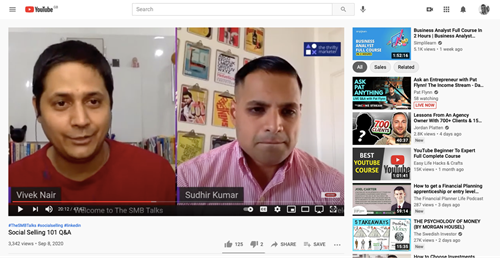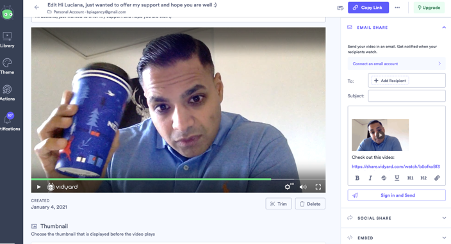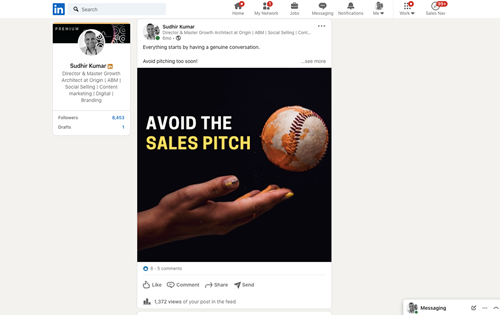The Right LinkedIn Mindset
We’ve all evolved and changed our mindsets and approach on a personal and professional level. The implications of COVID-19 have accelerated this, and our habits have changed.
We can now work from home. We can now do more online shopping. As a whole, we can now do more online. As a result, we as humans have embraced digital, and now that we have embraced it, I don’t see habits changing.
The way we communicate, interact, buy, sell, and live has been affected massively, and digital is paving a new way forward. With so many of us now online, this presents us with a fantastic opportunity. We can get to know our audience, our customers and prospects on a human-to-human level.
This brings me to what I really want to help address. How having the right mindset for LinkedIn right now and moving forward can be the best thing for you and your business.
The Right Mindset
We’ve established that the buyer and the buyer’s journey has changed. When it comes to sales and marketing, we need to approach it with the right mindset.
What do I mean by this? Well, in a nutshell: stop selling and start adding value!
The buyer has the upper hand, and they are savvy. Let’s be honest: who likes to be sold to? Who likes spam emails? Who likes cold calls? Who likes being pressured into a purchase? None of us, right? So, if you don’t like it then why do you expect your audience or potential buyers to?
If you want to grow your business, you need to realise it’s about relationships and establishing trust, and not about selling.
How do we do this? You need to communicate with your audience and express a desire to fulfil their needs to help them overcome the challenges they may be facing, or offer pathways to help solve their business problems. This is exactly how you add value – by using your insight and knowledge and sharing that through your content and touchpoints.
I’ll cover content in the forthcoming articles, but before we consider creating it, we need to first make sure we have the right mindset when it comes to our marketing.
To help you, always consider the following:
The Four Es
Educate
Why educate? We know none of us like to be sold to. Your audience doesn’t care about your products or services; they care about themselves.
You should focus on producing content that fulfils the wants, needs and interests of your audience. This will allow them to build trust and emotional connections to your brand. Don’t make the mistake of focusing on what you want to say - instead, focus on what your audience wants to learn from you.
Ask yourself the following:
- What information can I share that will provide value to my target audience or personas?
- What are the common pain points Person A faces that I can help with?
- What industry news can I share with my insights added?
- What’s current and trending?
Educating your audience will make your efforts shine, whether you do this through webinars, eBooks or in person. As long as you are relevant and putting in effort to educate, you will have the upper hand.
Entertain
Now, I know this one may throw you a little but stay with me. Just because you’re educating your audience, doesn’t mean you can’t entertain them at the same time. The type of content you produce will depend on your audience and the channels they prefer, but in our sales and marketing world, these will be pretty similar, such as LinkedIn.
By all means, create eBooks, vlogs, webinars, blogs, slide shares, podcasts and more. But remember: just because you’re using a professional channel like LinkedIn, it doesn’t mean you can’t entertain.
We all love stories, and there is nothing more central to the human experience than storytelling. Facts, statistics and theories have a part to play, but add in emotion, empathy and humour to really get across that human touch.
Keep your stories short and relatable and make sure they connect to the purpose of your content.
Finally, don’t forget to put your stamp on your content. You need to let your audience understand more about you. They need and want that human connection, so get your thoughts, experience and insights across in your own way.
Don’t mimic others. Be you, and be authentic.
Engage
Communicate with your audience. With mobile devices and the Internet of Things (IoT), we have a huge opportunity to communicate with our audience at anytime, anywhere in the world.
You should treat your audience and potential buyers as humans and not as leads or numbers. Have human interactions and meaningful conversations, and invest the time to truly understand them.
When it comes to your content, don’t be afraid to engage and interact with your potential prospects to get them involved. Ask questions, get them to give feedback, use polls, give them opportunities to speak up - this in turn makes them feel valued and builds your authenticity.
You can even go one step further and send them personal notes, messages, or even a video message. Show your audience you are real and interested in them and their feedback.
Emotional
Often overlooked in the B2B world, content with emotion appeals to human beings on a deeper level.
If we take into consideration neuroscience, it’s shown on a number of occasions that decisions are made at an emotional level. In the 1990s, neuroscientist Antonio Damasio conducted a study and concluded that, “Emotions and feelings are not a luxury, they are means of communicating our states of mind to others, but they are also a way of guiding our own judgements and decisions.”
So, if we really want to connect with our audience and influence them, we need to connect with them at an emotional level.
Personally, I’m not a fan of using fear or anxiety to attempt to move people into action. My advice would be to focus more on the excitement of solving problems, helping to relieve their anxieties and overcome their pain points.
Make them happy by taking an interest in them, learn about their challenges and goals. Craft a story that shows their problem and position you, your business, your brand and your service offering as the solution.
If you have worked with that particular persona within that particular industry, let it be known. Draw upon the experience, let the reader know you understand them, and you understand what they are feeling, as this gives them an opportunity to resonate.
Remember that when it comes to content, it’s not an opportunity to just talk about yourself. Create content that delivers true value to your audience and give them the content they need and want. In return, this will help your prospects learn, grow and improve which will result in a positive outcome when it comes to you and your personal brand.
Stop Selling and Start Adding Value
Businesses are built upon relationships, and relationships are all about establishing trust, rapport and value.
I know I’ve said this already, but no one really wants to be sold to - not even me or you. We are all busy people, we are selfish, and we only really want to communicate with someone we consider an expert, who can help to solve our problems.
As I mentioned at the beginning of this article, we need to evolve and adopt a new mindset.
In 2013, Gary Vaynerchuk wrote the book, Jab, Jab, Jab, Right hook: How to tell your story in a noisy social world. The analogy is that the jab is giving value, and the right hook is when you go to extract value. It’s a great book and if you haven’t read it, I recommend you do.
In today’s world, I think it’s more jabs and no hooks. If you’re truly giving value, you don’t need the sales pitch or message. If you truly resonate with your audience, have built that rapport, trust and confidence, prospects will naturally want to do business with you.
See the difference? If ever in doubt, put yourself in your audience’s shoes - after all, they are humans too.
This leads me nicely to my next point: we are all human beings, so this means we can spot a sales strategy and pitch a mile off. If you’re using the same methods and techniques from 10, 20, 30 years ago, it won’t resonate anymore. You’re not only wasting your time, but you’re also annoying your potential customers.
Today’s buyer is savvy - we all are - but why? Because we have the IoT. Today’s buyer does their homework before making purchasing decisions.
In truth, the vast majority of the buying journey and decisions begin and often conclude on the internet, so you need to be visible. Yes, search engine optimisation (SEO), adverts, and content all have a part to play, but for me this is where you should leverage social selling.
By simply having a presence on the right channels for your audience, be it YouTube, LinkedIn, or Twitter, you are opening up new communication channels, making yourself visible to those looking to find out what you have to offer.

Social selling lets your sales team build ‘real’ relationships
Nobody likes cold calling – it’s intrusive and the statistics show it’s ineffective. Using tools to perform social listening on topics relevant to your industry allows your sales team to identify new leads that are already talking about your business, competitors, or your industry, so you can reach out to them in an appropriate way.
Read more
Employee Advocacy is Growing: How to Harness the Power
Employee advocacy helps businesses extend and increase their digital presence. It can help you nurture relationships and influence key people, such as customers, prospects, current and future employees.
Read more
Why Employee Advocacy is Important
Employee advocacy is more than just a buzzword. The buyer and the buying journey has evolved, and we as human beings have evolved thanks to the IOT. In today’s digital world, we have so much information at our fingertips which serves to influence our purchasing decisions.
Read more






